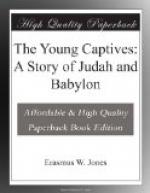The reader is already aware that the king had been twice disturbed by the dark predictions of the persecuted Jeremiah. In the attempt to throw off his embarrassment, and appear courageous before his friends, he sought relief in mixed wines, of which he partook without restraint. These, in a measure, proved sufficient to stupefy his guilty conscience, but they added to his vanity and self-conceit. Long before the hour arrived for the delivery of the royal address, the King of Judah’s conversation amounted to nothing more than drunken babbling.
A number of his most influential courtiers endeavored, with all their tact and ingenuity, to dissuade their sovereign from the attempt, urging that the excitement of the night had already so prostrated him that it would be unsafe for his health to enter again into the uproar of the festive hall. Now, Sherakim had come to the conclusion that their arguments had finally prevailed, and that the king had been comfortably removed to his bed-chamber; hence his remarks, which were cut short by the sudden appearance of the king. Jehoiakim, without any ceremony, commanded the orator to fall back; which command was instantly obeyed. Instead of ascending the throne, as usual, he took the stand that had been vacated by Sherakim, waved his hand, and loudly laughed, while the audience cheered; then, with violent gestures and faltering tongue, he went on:
“Princes and Nobles of Judah! I am here! I tell you I am here! Am I not Jehoiakim, King of Judah? Is not this the glorious reign of my anniversary? Where is the villain that dares to say it is not? Then that is a settled question. I hear no contradiction. Who dares contradict? I hear no reply. Who is afraid of the King of Babylon? If ye know of such an one, bring the cowardly dog to me, and I will take off his head—Ha! ha! ha! Old Jeremiah! Where is he? Ah, I’ll soon put him out of the way. Can there be any danger while the King of Babylon is fighting with the King of Egypt?
“Princess and Nobles of Judah! I perceive ye understand your sovereign. We are all safe! He dethroned me three years ago—Ha! ha! ha! Will he do it again? Shall I pay him any more tribute money? Never! I defy his power! And to-morrow I shall punish the enemies of Judah who live in our midst. Tomorrow shall flow rivers of blood!”
The heavy blasts of trumpets were now distinctly heard without, which arrested the king in his drunken speech. A number of officers rose to their feet. A young officer in uniform rushed into the banquet-hall and cried at the top of his voice: “To arms! To arms! To arms, O Judah! The legions of the Chaldeans are approaching the Holy City! To arms! To arms! To arms!” and the officer hurried again into the street. The confusion that ensued was indescribable. Officers ran to and fro in wild haste. Wives and daughters wailed, lamented, and clung to their husbands and fathers in the utmost dismay. Hilarity and mirth were turned into sorrow and bitter lamentations. Those proud and lofty arches that had so lately rung to the sound of the merry song and boisterous laugh, now answered to the distracted cry of the fair daughters of Judah. Thus, in “confusion worse confounded,” broke up the great festival of the last anniversary of the reign of Jehoiakim, King of Judah.




